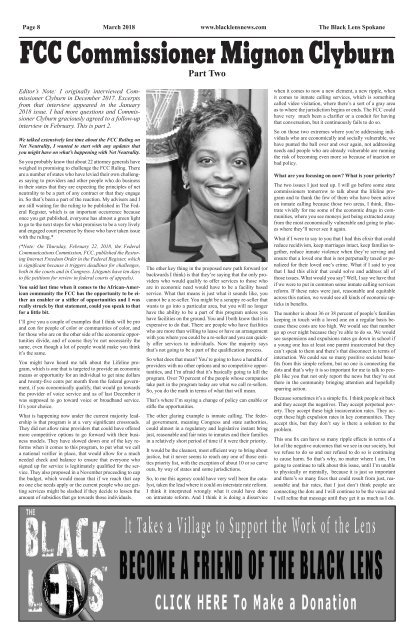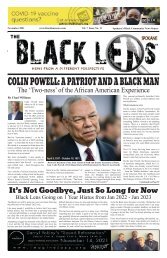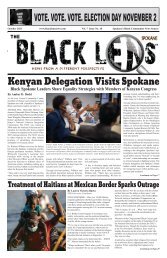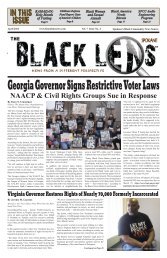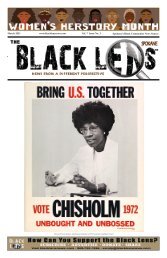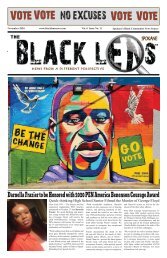Black Lens March 2018
The Black Lens is an independent community newspaper that focuses on the news, issues, people and information of importance to the African American community.
The Black Lens is an independent community newspaper that focuses on the news, issues, people and information of importance to the African American community.
You also want an ePaper? Increase the reach of your titles
YUMPU automatically turns print PDFs into web optimized ePapers that Google loves.
Page 8<br />
<strong>March</strong> <strong>2018</strong><br />
www.blacklensnews.com<br />
The <strong>Black</strong> <strong>Lens</strong> Spokane<br />
FCC Commissioner Mignon Clyburn<br />
Part Two<br />
Editor’s Note: I originally interviewed Commissioner<br />
Clyburn in December 2017. Excerpts<br />
from that interview appeared in the January<br />
<strong>2018</strong> issue. I had more questions and Commissioner<br />
Clyburn graciously agreed to a follow-up<br />
interview in February. This is part 2.<br />
We talked extensively last time about the FCC Ruling on<br />
Net Neutrality, I wanted to start with any updates that<br />
you might have on what’s happening with Net Neutrality.<br />
So you probably know that about 22 attorney generals have<br />
weighed in promising to challenge the FCC Ruling. There<br />
are a number of states who have levied their own challenges<br />
saying to providers and other people who do business<br />
in their states that they are expecting the principles of net<br />
neutrality to be a part of any contract or that they engage<br />
in. So that’s been a part of the reaction. My advisers and I<br />
are still waiting for the ruling to be published in The Federal<br />
Register, which is an important occurrence because<br />
once you get published, everyone has almost a green light<br />
to go to the next steps for what promises to be a very lively<br />
and engaged court presence by those who have taken issue<br />
with the ruling.*<br />
(*Note: On Thursday, February 22, <strong>2018</strong>, the Federal<br />
Communications Commission, FCC, published the Restoring<br />
Internet Freedom Order in the Federal Register, which<br />
is significant because it triggers deadlines for challenges,<br />
both in the courts and in Congress. Litigants have ten days<br />
to file petitions for review in federal courts of appeals).<br />
You said last time when it comes to the African-American<br />
community the FCC has the opportunity to be either<br />
an enabler or a stifler of opportunities and I was<br />
really struck by that statement, could you speak to that<br />
for a little bit.<br />
I’ll give you a couple of examples that I think will be pro<br />
and con for people of color or communities of color, and<br />
for those who are on the other side of the economic opportunities<br />
divide, and of course they’re not necessarily the<br />
same, even though a lot of people would make you think<br />
it’s the same.<br />
You might have heard me talk about the Lifeline program,<br />
which is one that is targeted to provide an economic<br />
means or opportunity for an individual to get nine dollars<br />
and twenty-five cents per month from the federal government,<br />
if you economically qualify, that would go towards<br />
the provider of voice service and as of last December it<br />
was supposed to go toward voice or broadband service.<br />
It’s your choice.<br />
What is happening now under the current majority leadership<br />
is that program is at a very significant crossroads.<br />
They did not allow nine providers that could have offered<br />
more competitive options to go forward with their business<br />
models. They have slowed down one of the key reforms<br />
when it comes to this program, to put what we call<br />
a national verifier in place, that would allow for a much<br />
needed check and balance to ensure that everyone who<br />
signed up for service is legitimately qualified for the service.<br />
They also proposed in a November proceeding to cap<br />
the budget, which would mean that if we reach that cap<br />
no one else needs apply or the current people who are getting<br />
services might be slashed if they decide to lessen the<br />
amount of subsidies that go towards those individuals.<br />
The other key thing in the proposed new path forward (or<br />
backwards I think) is that they’re saying that the only providers<br />
who would qualify to offer services to those who<br />
are in economic need would have to be a facility based<br />
service. What that means is just what it sounds like, you<br />
cannot be a re-seller. You might be a scrappy re-seller that<br />
wants to go into a particular area, but you will no longer<br />
have the ability to be a part of this program unless you<br />
have facilities on the ground. You and I both know that it is<br />
expensive to do that. There are people who have facilities<br />
who are more than willing to lease or have an arrangement<br />
with you where you could be a re-seller and you can quickly<br />
offer services to individuals. Now the majority says<br />
that’s not going to be a part of the qualification process.<br />
So what does that mean? You’re going to have a handful of<br />
providers with no other options and no competitive opportunities,<br />
and I’m afraid that it’s basically going to kill the<br />
program. Over 70 percent of the people whose companies<br />
take part in the program today are what we call re-sellers.<br />
So, you do the math in terms of what that will mean.<br />
That’s where I’m saying a change of policy can enable or<br />
stifle the opportunities.<br />
The other glaring example is inmate calling. The federal<br />
government, meaning Congress and state authorities,<br />
could almost in a regulatory and legislative instant bring<br />
just, reasonable and fair rates to inmates and their families<br />
in a relatively short period of time if it were their priority.<br />
It would be the cleanest, most efficient way to bring about<br />
justice, but it never seems to reach any one of those entities<br />
priority list, with the exception of about 10 or so carve<br />
outs, by way of states and some jurisdictions.<br />
So, to me this agency could have very well been the catalyst,<br />
taken the lead where it could on interstate rate reform.<br />
I think it interpreted wrongly what it could have done<br />
on intrastate reform. And I think it is doing a disservice<br />
when it comes to now a new element, a new ripple, when<br />
it comes to inmate calling services, which is something<br />
called video visitation, where there’s a sort of a gray area<br />
as to where the jurisdiction begins or ends. The FCC could<br />
have very much been a clarifier or a conduit for having<br />
that conversation, but it continuously fails to do so.<br />
So on those two extremes where you’re addressing individuals<br />
who are economically and socially vulnerable, we<br />
have punted the ball over and over again, not addressing<br />
needs and people who are already vulnerable are running<br />
the risk of becoming even more so because of inaction or<br />
bad policy.<br />
What are you focusing on now? What is your priority?<br />
The two issues I just teed up. I will go before some state<br />
commissioners tomorrow to talk about the lifeline program<br />
and to thank the few of them who have been active<br />
on inmate calling because those two areas, I think, illustrate<br />
vividly for me some of the economic drags in communities,<br />
where you see moneys just being extracted away<br />
from the most economically vulnerable and going to places<br />
where they’ll never see it again.<br />
What if I were to say to you that I had this elixir that could<br />
reduce recidivism, keep marriages intact, keep families together,<br />
reduce inmate violence when they’re serving and<br />
ensure that a loved one that is not perpetually taxed or penalized<br />
for their loved one’s crime. What if I said to you<br />
that I had this elixir that could solve and address all of<br />
those issues. What would you say? Well, I say we have that<br />
if we were to put in common sense inmate calling services<br />
reform. If these rates were just, reasonable and equitable<br />
across this nation, we would see all kinds of economic upticks<br />
in benefits.<br />
The number is about 36 or 38 percent of people’s families<br />
keeping in touch with a loved one on a regular basis because<br />
these costs are too high. We would see that number<br />
go up over night because they’re able to do so. We would<br />
see suspensions and expulsions rates go down in school if<br />
a young one has at least one parent incarcerated but they<br />
can’t speak to them and there’s that disconnect in terms of<br />
interaction. We could see so many positive societal benefits<br />
from this simple reform, but no one is connecting the<br />
dots and that’s why it is so important for me to talk to people<br />
like you that not only report the news but they’re out<br />
there in the community bringing attention and hopefully<br />
spurring action.<br />
Because sometimes it’s a simple fix. I think people sit back<br />
and they accept the negatives. They accept perpetual poverty.<br />
They accept these high incarceration rates. They accept<br />
these high expulsion rates in key communities. They<br />
accept this, but they don’t say is there a solution to the<br />
problem.<br />
This one fix can have so many ripple effects in terms of a<br />
lot of the negative outcomes that we see in our society, but<br />
we refuse to do so and our refusal to do so is continuing<br />
to cause harm. So that’s why, no matter where I am, I’m<br />
going to continue to talk about this issue, until I’m unable<br />
to physically or mentally, because it is just so important<br />
and there’s so many fixes that could result from just, reasonable<br />
and fair rates, that I just don’t think people are<br />
connecting the dots and I will continue to be the voice and<br />
I will refine that message until they get it as much as I do.


